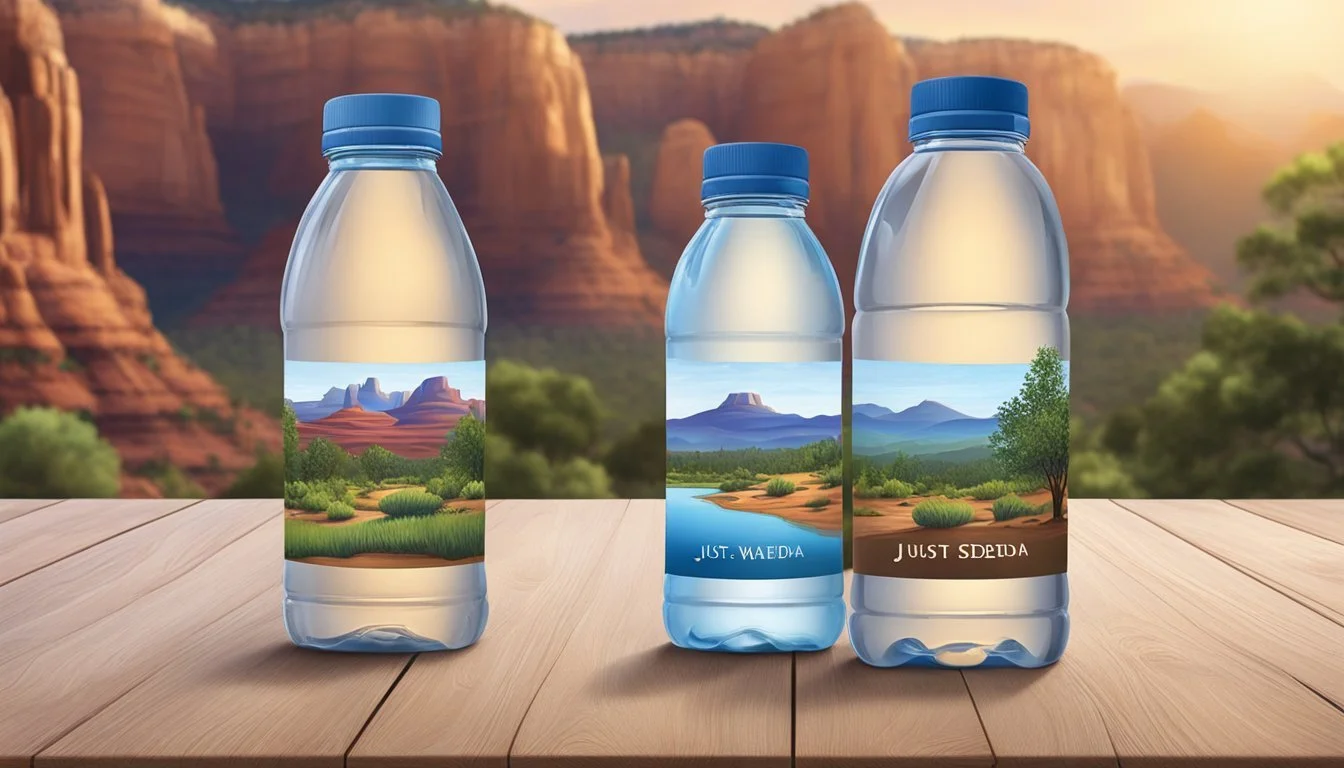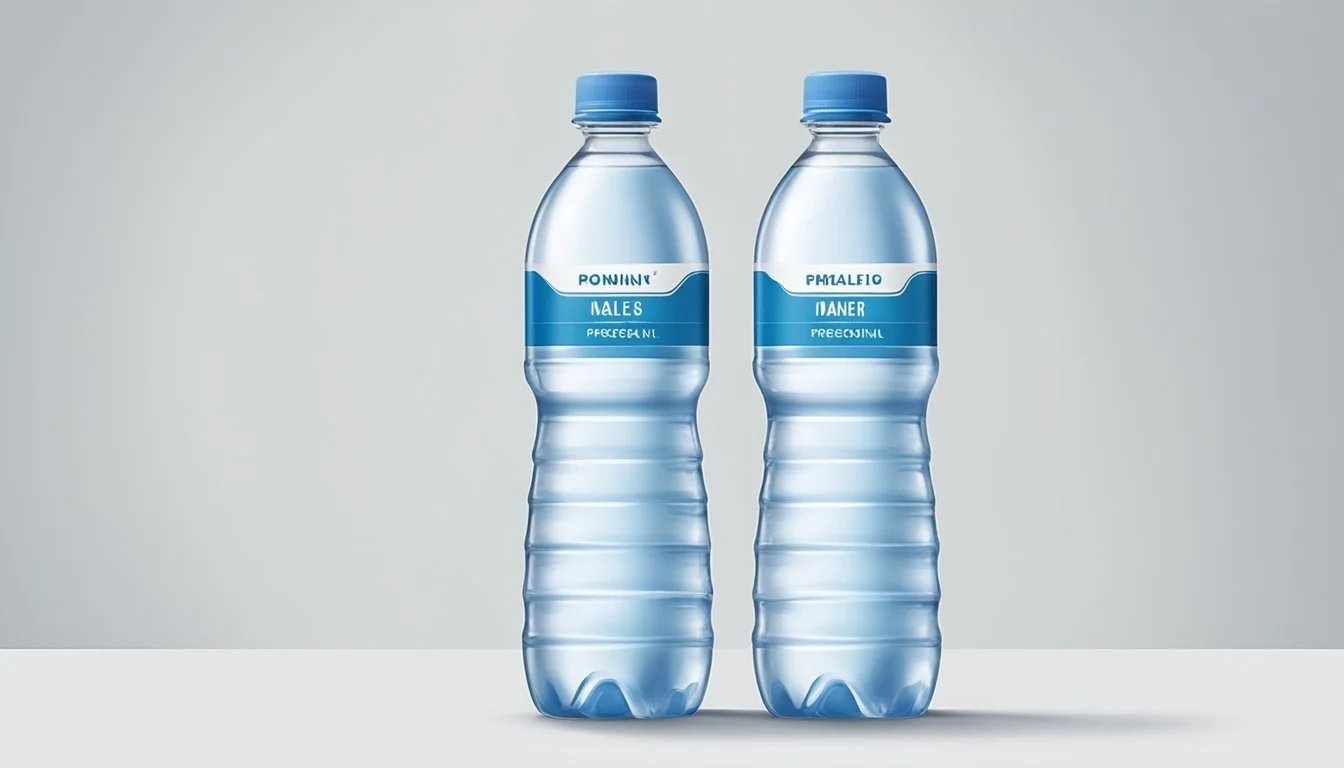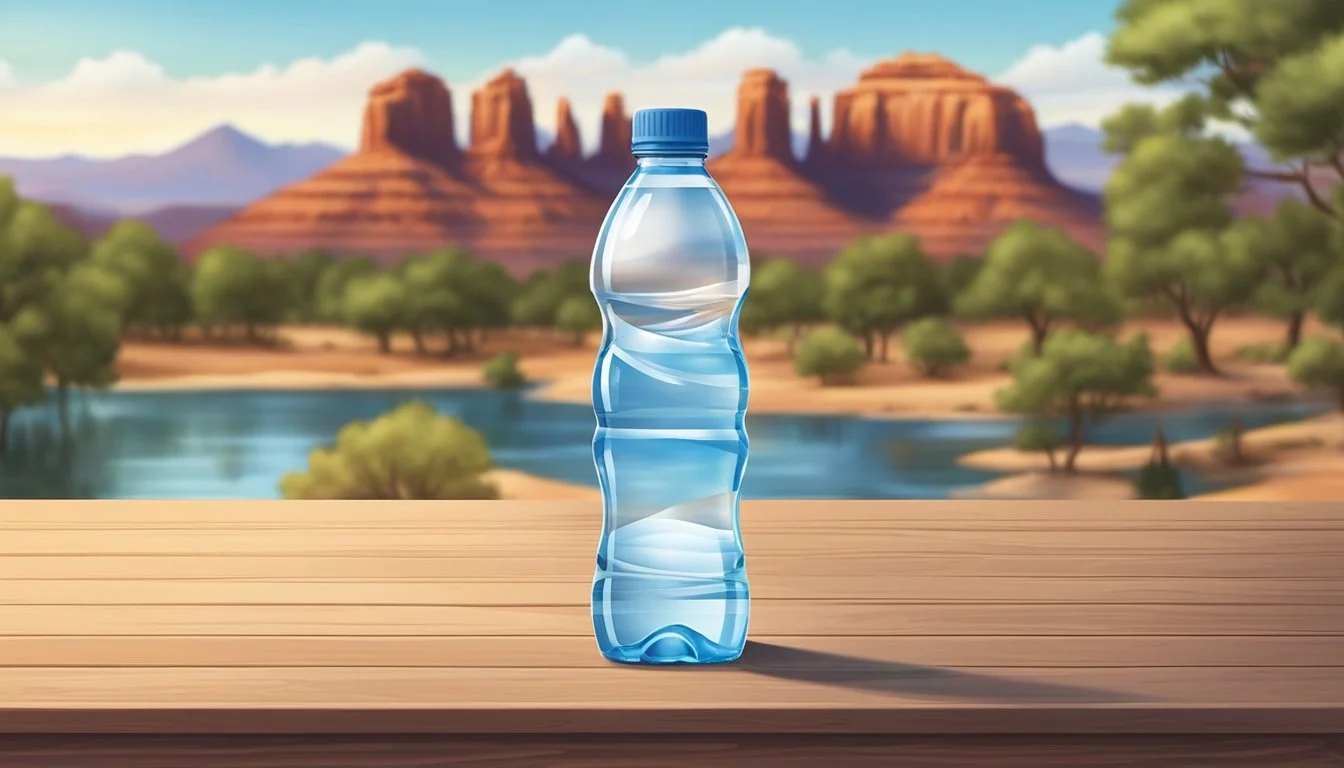Just Water vs. Purely Sedona
Ultimate Bottled Water Showdown
Choosing the best bottled water can be a challenge, especially with the growing number of environmentally friendly options on the market. Just Water and Purely Sedona are two popular choices among eco-conscious consumers. Both brands boast renewable resources and a commitment to sustainability, but one may offer a more enticing package over the other.
Just Water stands out with its well-rounded balance of taste and ethical considerations, employing a bio-plastic cap and majority paper-based design. In contrast, Purely Sedona emphasizes the purity of its water source, offering naturally alkaline spring water that many find refreshing. While Just Water excels in sustainable packaging, the quality and origin of Purely Sedona's product cannot be overlooked.
Ultimately, the decision between Just Water and Purely Sedona hinges on individual preferences regarding taste, packaging, and the importance placed on a water's source. By understanding the unique benefits each brand offers, consumers can make an informed choice that aligns with their values and taste requirements.
Understanding Bottled Water
Bottled water comes in various forms, each regulated by specific standards to ensure safety and quality. It is important to recognize the different categories and the regulatory bodies that govern them for better understanding and informed choices.
Defining Bottled Water Categories
Bottled water is commonly divided into several categories, including spring water, mineral water, distilled water, and sparkling water.
Spring Water is derived from an underground formation and must flow naturally to the earth's surface.
Mineral Water contains specific amounts of dissolved minerals and is extracted from protected underground sources.
Distilled Water undergoes a distillation process, where impurities are removed by boiling and re-condensation.
Sparkling Water contains carbon dioxide, either naturally or artificially added during bottling.
Each type offers unique characteristics, from taste to mineral content, catering to various preferences and requirements.
Regulatory Bodies and Standards
The FDA (Food and Drug Administration) oversees bottled water standards in the United States, ensuring safety and proper labeling. Bottled water must adhere to the EPA (Environmental Protection Agency)'s standards for tap water, though the two are regulated differently.
Bottlers must follow specific guidelines such as contamination limits, proper labeling, and processing standards. Imported bottled water must also comply with FDA regulations before entering the U.S. market.
Regular inspections and quality tests are conducted to maintain these standards, providing assurance that bottled water is safe and accurately represented for consumers.
Analyzing Water Quality and Purity
Assessing the quality and purity of Just Water and Purely Sedona involves examining several factors: pH levels and alkalinity, mineral content and TDS, and contaminants and chemicals analysis.
PH Levels and Alkalinity
pH levels indicate how acidic or alkaline water is. Purely Sedona sparkling water is known to be acidic, which might not be ideal for those seeking alkaline water for potential health benefits. On the other hand, Just Water typically has a neutral to slightly alkaline pH, making it more appealing to some consumers.
Alkalinity is also crucial as it helps in neutralizing acids in the body. This can be beneficial for maintaining optimal health functions.
Brand PH Level Range Just Water Neutral to Slightly Alkaline Purely Sedona Acidic
Mineral Content and TDS
The mineral content of bottled water can greatly affect its taste and potential health benefits. Essential minerals like calcium, magnesium, and potassium should ideally be present in significant amounts. Just Water is often appreciated for a balanced mix of these minerals.
Total Dissolved Solids (TDS) measure the combined content of all inorganic and organic substances in water. A low TDS is often preferred, indicating fewer impurities and better purity.
Mineral Just Water Purely Sedona Calcium Moderate Low Magnesium Moderate Low Potassium Moderate Low
Contaminants and Chemicals Analysis
Contaminants such as PFAS (Per- and Polyfluoroalkyl Substances) can be found in some bottled waters. Consumer Reports identified toxic PFAS chemicals in several popular brands. Regular testing for these substances is crucial to ensure safety.
Just Water uses plant-based packaging, which could reduce chemical leaching compared to traditional plastic bottles. Purely Sedona's quality reports should be reviewed to ensure no harmful chemicals are present in their products.
Lead and other heavy metals are significant concerns. Both brands must be scrutinized for any traces of these elements to maintain consumer trust and safety.
Assessing Taste Profiles
Taste profiles of bottled water can significantly influence consumer preference. By comparing Just Water and Purely Sedona, various factors such as taste, water source, and added electrolytes are evaluated to determine the superior choice.
Taste Comparison Between Brands
Just Water presents a balanced and clean taste.
It is bottled in 100% spring water, giving it a refreshing flavor without any aftertaste. Consumers often describe it as crisp and straightforward.
Purely Sedona, known for its natural artesian spring source, offers a slightly sweeter and more rounded flavor profile. The water is extracted from deep within Arizona's red rock formations, which some believe imparts unique mineral notes that enhance its taste.
The Role of Source in Flavor
The source of the water plays a pivotal role in its taste.
Just Water comes from the Glens Falls watershed in New York. This sources water that is naturally alkaline with a pH around 8.0, offering a smooth and refreshing taste.
Purely Sedona, on the other hand, is sourced from artesian springs in Sedona, Arizona. These springs provide water with a balanced mineral content, promoting a fuller and richer flavor. This natural artesian water tends to have a blend of calcium, magnesium, and other minerals that can subtly affect its taste.
The Impact of Added Electrolytes on Palatability
Both brands enhance their water with added electrolytes to improve taste and hydration.
Just Water adds potassium bicarbonate and magnesium sulfate, which enhance flavor and provide a slight mineral sweetness.
Purely Sedona naturally contains electrolytes due to its artesian spring source but may also have added sodium and potassium to maintain consistency. These electrolytes contribute to a rounder mouthfeel and ensure the water remains refreshing under different conditions.
In conclusion, Just Water’s clean taste is a result of its source and minimal mineral content, while Purely Sedona offers a fuller, slightly sweeter taste from its natural artesian origins and electrolyte content. The choice between them depends largely on individual preference for a crisp versus a mineral-rich flavor.
Packaging and Environmental Concerns
When comparing Just Water and Purely Sedona, it is crucial to consider their packaging materials and the related environmental impacts. Different types of bottles affect sustainability, carbon emissions, and recyclability.
Bottles: Plastic vs. Glass vs. Plant-Based Cartons
Just Water and Purely Sedona use distinct packaging materials. Just Water opts for plant-based cartons, primarily made of paper, a small amount of aluminum, and plastic derived from plants.
Purely Sedona often uses high-quality glass bottles. Glass bottles are reusable and generally have a lower environmental impact compared to traditional plastic bottles. However, they are heavier, which influences transportation emissions.
Plastic bottles are still widely used by many brands, contributing significantly to plastic waste. Unlike glass, plastic isn't always recyclable and can persist in the environment for centuries.
The Carbon Footprint of Bottled Water
The carbon footprint of bottled water packaging varies. Plant-based cartons from Just Water aim to minimize carbon emissions. Their packaging is lighter, resulting in reduced transportation-related emissions.
In contrast, glass bottles, like those used by Purely Sedona, have a higher carbon footprint in production and transport due to their weight. Despite this, glass can be reused multiple times, reducing the long-term impact.
Plastic bottles hold the highest carbon emissions. Production and recycling processes are energy-intensive and often result in substantial environmental impact. Aluminum-based packaging also has high emissions due to the energy required for production, although recycling it can mitigate this.
Recycling and Sustainability Efforts
Just Water's plant-based cartons are recyclable, but the multi-material composition can complicate the process. They emphasize using renewable resources, contributing to overall sustainability.
Purely Sedona’s glass bottles boast excellent recyclability. Glass can be recycled indefinitely without loss of quality, making it a sustainable choice if properly disposed of.
Plastic bottles pose a significant challenge for recycling. While theoretically recyclable, many end up as plastic waste due to improper disposal and limited recycling facilities. Brands using plastic must invest in significant sustainability efforts to minimize this impact.
Both Just Water and Purely Sedona promote recycling to enhance sustainability but face different challenges based on their packaging choices.
Health and Safety Aspects
Examining the health and safety aspects of Just Water and Purely Sedona involves an evaluation of their nutritional value, hydration benefits, and safeguards against harmful substances. Notable factors include the presence of essential minerals, the balance of electrolytes, and the absence of contaminants.
Nutritional Value and Hydration
Just Water and Purely Sedona both offer significant hydration benefits. Just Water, sourced from natural springs, contains essential minerals such as calcium and magnesium. These minerals are crucial for maintaining bone health and energy levels. Purely Sedona, sourced from the red rocks of Sedona, also boasts a high mineral content, including silica which is beneficial for the skin and joints.
Mineral Composition Table:
Mineral Just Water (mg/L) Purely Sedona (mg/L) Calcium 20 10 Magnesium 15 12 Silica 5 25
Electrolytes, such as sodium and potassium, are present in both brands, aiding in better hydration and muscle function. For athletes and active individuals, both waters support the body's requirements for replenishing lost fluids and maintaining electrolyte balance.
Safeguards Against Harmful Substances
In terms of safety, both brands prioritize the purity of their water. Just Water has adopted a rigorous filtration process to eliminate heavy metals and other contaminants. Testing has shown that Just Water is free from substances like lead and arsenic, ensuring it is safe for daily consumption, including for children.
Purely Sedona also focuses on purity, undergoing extensive testing to ensure the absence of microplastics, pesticides, and other harmful substances. Additionally, its bottling process is designed to avoid contamination, maintaining the water's pristine quality.
Key Safety Measures:
Just Water: Advanced filtration, regular quality checks, plant-based packaging
Purely Sedona: Comprehensive contaminant testing, eco-conscious bottle design
Both brands exhibit strong safeguards to protect consumers' health, offering bottled waters that are not only nutritious but also free from potentially harmful substances.
Economic Factors
When comparing Just Water and Purely Sedona, economic factors play a crucial role. This analysis covers how these bottled water brands stack up in terms of cost and availability across various retail channels.
Cost Comparison of Water Brands
The price of bottled water varies significantly based on the brand and packaging. Just Water typically retails for about $1.50 per liter. In contrast, Purely Sedona tends to be more expensive, averaging around $2.00 per liter. Just Water, marketed as a more sustainable option, uses recycled materials, which may contribute to its relatively lower cost.
Purely Sedona, known for its premium quality, often carries a higher price tag due to its unique sourcing and packaging in eco-friendly glass bottles. Price-sensitive consumers might find Just Water to be a more budget-friendly choice, while those prioritizing premium quality might opt for Purely Sedona despite the additional cost.
Access and Availability in Retail
Both Just Water and Purely Sedona are widely available, but their retail presence differs. Just Water can be found in major grocery stores like Whole Foods, Walmart, and Target, making it easily accessible for many consumers. Its broad distribution network and affordability contribute to its convenience.
Purely Sedona, although available at retailers like Whole Foods and specialty grocery stores, may not be as ubiquitous. Its higher price point and premium positioning mean it’s often stocked in more upscale retail settings. Consumers looking for Purely Sedona might need to visit specialty shops or high-end grocery stores, which could be less convenient depending on their location.
Consumer Preferences and Trends
Consumer behaviors in the bottled water market highlight a growing interest in health and sustainability. Key trends include a notable shift towards eco-conscious consumerism and increasing demand for variety and innovative alternatives.
Shift Towards Eco-Conscious Consumerism
Consumers are increasingly driven by environmental concerns when choosing bottled water. This shift is evident as more brands, like Just Water and Purely Sedona, emphasize sustainable packaging.
Dasani and Aquafina have introduced bottles made from recycled and plant-based plastics. Transparent labeling about the environmental impact also influences preferences, urging brands to adopt greener practices.
Eco-conscious consumers prefer minimalistic packaging that reduces plastic waste. This trend underscores the importance of sustainability in brand loyalty and purchase decisions, favoring those prioritizing eco-friendly solutions.
Variety and Innovative Alternatives
The market for bottled water is diverse, offering a range of options from Evian to Voss. Consumers seek out unique attributes—like the mineral-rich taste of Icelandic Glacial or the sleek packaging of Core Hydration.
Innovations such as electrolyte-enhanced Smartwater or pH-balanced LIFEWTR appeal to health-conscious buyers. Convenience is critical; single-serve, resealable bottles dominate shelves, meeting on-the-go lifestyle demands.
Brands must continuously innovate to stay relevant, providing both standard and premium options that cater to discerning tastes and specific health preferences.
Conclusion
Just Water offers a low-cost option with plant-based packaging materials. This appeals to consumers looking for a more sustainable choice.
Purely Sedona provides high-quality spring water from the natural springs of Sedona, Arizona. The brand emphasizes its natural sourcing and minimal processing.
When it comes to consumer choice, those prioritizing environmental impact may prefer Just Water.
Consumers who value premium taste might lean towards Purely Sedona.
Lifetime value is essential. Just Water might present better value for regular purchases due to its lower price point.
Both brands have unique strengths, making them worthwhile considerations in the bottled water market.
More About Just Water
Core Hydration vs Just Water: Which Bottled Water is Better?
Icelandic Glacial vs Just Water: Which Bottled Water is Better?
Just Water vs Aqua Carpatica: Which Bottled Water is Better?
Just Water vs Cascade Mountain: Which Bottled Water is Better?
Just Water vs Crystal Geyser: Which Bottled Water is Better?
Just Water vs Hawaii Volcanic: Which Bottled Water is Better?
Just Water vs Hawaiian Springs: Which Bottled Water is Better?
Just Water vs Kirkland Signature: Which Bottled Water is Better?
Just Water vs Mountain Valley Spring Water: Which Bottled Water is Better?
Just Water vs Nestle Pure Life: Which Bottled Water is Better?
Just Water vs Richard's Rainwater: Which Bottled Water is Better?
Just Water vs San Pellegrino: Which Bottled Water is Better?
Just Water vs Solan de Cabras: Which Bottled Water is Better?
Just Water vs Talking Rain AQA: Which Bottled Water is Better?
Just Water vs Whole Foods 365: Which Bottled Water is Better?
Just Water vs Whole Foods Italian Still Mineral water: Which Bottled Water is Better?
More About Purely Sedona
Aqua Carpatica vs Purely Sedona: Which Bottled Water is Better?
Boxed Water vs Purely Sedona: Which Bottled Water is Better?
Castle Rock vs Purely Sedona: Which Bottled Water is Better?
Core Hydration vs Purely Sedona: Which Bottled Water is Better?
Hawaii Volcanic vs Purely Sedona: Which Bottled Water is Better?
Hawaiian Springs vs Purely Sedona: Which Bottled Water is Better?
Ice Mountain vs Purely Sedona: Which Bottled Water is Better?
Icelandic Glacial vs Purely Sedona: Which Bottled Water is Better?
Mountain Valley Spring Water vs Purely Sedona: Which Bottled Water is Better?
Nestle Pure Life vs Purely Sedona: Which Bottled Water is Better?
Poland Spring vs Purely Sedona: Which Bottled Water is Better?
Purely Sedona vs Cascade Mountain: Which Bottled Water is Better?
Purely Sedona vs Crystal Geyser: Which Bottled Water is Better?
Purely Sedona vs Crystal Lake: Which Bottled Water is Better?
Purely Sedona vs Essence pH10: Which Bottled Water is Better?
Purely Sedona vs Kirkland Signature: Which Bottled Water is Better?
Purely Sedona vs Liquid Death: Which Bottled Water is Better?
Purely Sedona vs Proud Source: Which Bottled Water is Better?
Purely Sedona vs Richard's Rainwater: Which Bottled Water is Better?
Purely Sedona vs Simple Truth: Which Bottled Water is Better?
Purely Sedona vs Talking Rain AQA: Which Bottled Water is Better?
Purely Sedona vs Weird Water: Which Bottled Water is Better?
Purely Sedona vs Whole Foods 365: Which Bottled Water is Better?
Purely Sedona vs Whole Foods Italian Still Mineral water: Which Bottled Water is Better?
San Pellegrino vs Purely Sedona: Which Bottled Water is Better?
Solan de Cabras vs Purely Sedona: Which Bottled Water is Better?
Zephyrhills vs Purely Sedona: Which Bottled Water is Better?





